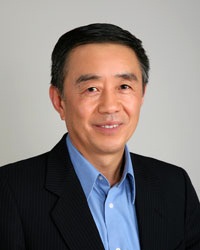Qingping Dou
Professor
Basic Science
Office location
Karmanos Cancer Institute
Hudson-Webber Cancer Research Center
4100 John R
Detroit, MI 48201
Mailing address
Karmanos Cancer Institute
4100 John R, HW05AO
Detroit, MI 48201
Office phone
313-576-8301Office fax
313-576-8307Education training
Education
(1988) Ph.D. Chemistry, Rutgers University, Piscataway, NJ
(1981) B.S. Chemistry, Shandong University, Jinan, Shandong, People's Republic of China
Postgraduate Training
(1988-1993) Postdoctoral Research Fellow, Dana-Farber Cancer Institute, Harvard Medical School, Boston, MA
Professional experience
Faculty Appointments
(2010-Present) Professor, Department of Oncology, Wayne State University School of Medicine, Detroit, MI
(2009-Present) Professor, Department of Pharmacology, Wayne State University School of Medicine, Detroit, MI
(2003-Present) Professor, Department of Pathology, Wayne State University School of Medicine, Detroit, MI
(2000-2003) Associate Professor, Department of Interdisciplinary Oncology, University of SouthFloridaCollege of Medicine, Tampa, FL
(1998-2003) Associate Professor, Department of Biochemistry and Molecular Biology, University of South Florida College of Medicine, Tampa, FL
(1993-1998) Assistant Professor, Department of Pharmacology, University of PittsburghSchool of Medicine, Pittsburgh, PA
Hospital or Other Professional Appointments
(2012-Present) Scientific Member, Molecular Therapeutics Program, Barbara Ann Karmanos Cancer Institute, Detroit, MI
(2010-2011) Co-Program Leader and Scientific Member, Developmental Therapeutics Program, Barbara Ann Karmanos Cancer Institute, Detroit, MI
(2003-2010) Co-Program Leader and Scientific Member, Population Studies and Prevention Program, Barbara Ann Karmanos Cancer Institute, Detroit, MI
(1998-2003) Member in Residence (Scientific Member), Drug Discovery Program, H. Lee Moffitt Cancer Center & Research Institute, Tampa, FL
(1993-1998) Member, Experimental Therapeutic Program, University of Pittsburgh Cancer Institute, Pittsburgh, PA
Major professional societies
American Association for Cancer Research, Inc.
American Association for the Advancement of Science
American Society for Pharmacology and Experimental Therapeutics
American Chemistry Society
Honors and awards
(2007) WayneStateUniversitySchool of Medicine Research Excellence Award Nominee
(2006) Karmanos Cancer Center Director's Award (for the article published by Yang HJ, Chen D, Cui QC, Yuan X, and Dou QP in Cancer Research 66, 4758-4765, 2006).
(2000) Moffitt Cancer Center & Research Institute Director's Award (for the article published by Li B and Dou QP in Proc. Natl. Acad. Sci. USA, 2000; 97:3850-3855)
Courses taught
CB 7210: Fundamentals of Cancer Biology
CB 7460: Mechanisms of Neoplasia: Alterations to Cellular Signaling
CB 7700: Cancer Biology Journal Club
CB 7890: Cancer Biology Student Seminars
Research interests
The main objective in this laboratory is to discover molecular targets of natural products in pre-clinical studies, followed by validation in targeted cancer intervention clinical trials. Dr. Dou's laboratory is one of the first to report that proteasome inhibitors rapidly induce tumor cell apoptosis, selectively activate the cell death program in oncogene-transformed, but not normal or untransformed cells, and are able to trigger apoptotic death in human cancer cells that are resistant to various anticancer agents. Possible molecular mechanisms involve, at least in part, accumulation of the cyclin-dependent kinase inhibitor p27kip and the apoptosis inducer Bax. Dr. Dou's laboratory has also shown that some tea polyphenols and medicinal compounds potently and specifically inhibit the chymotrypsin-like activity of the proteasome in vitro and in vivo at physiological concentrations. Furthermore, his laboratory has established, for the first time, a computational molecular model that shows how these natural compounds bind and target the proteasome chymotrypsin subunit. This innovative computational model has been validated by comparison of predicted and actual activities of various analogs, either naturally occurring or rationally designed and synthesized. Recently, Dr. Dou and collaborators have reported that certain copper-binding drugs (such as the antialcoholism drug Disulfiram) can convert the pro-angiogenic copper to a specific cancer cell death inducer, and that environmental toxic organotins target the proteasome in human cells and proteasome inhibition by organotins contributes to their cellular toxicity.
